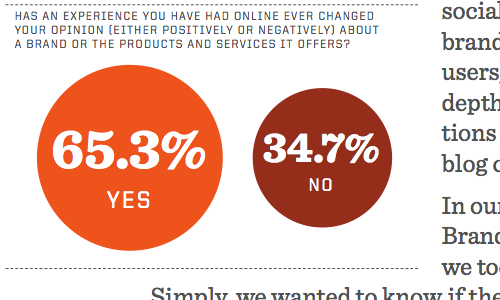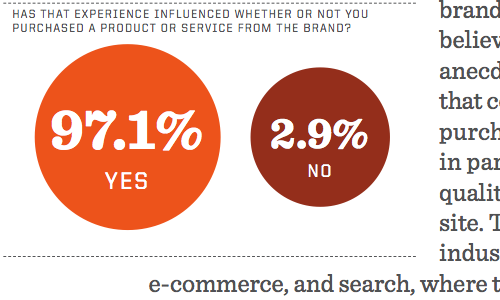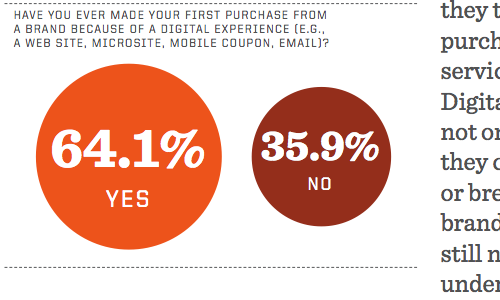Sometimes hijacking a popular function on the world’s most popular social network is simply the best approach to viral marketing. Forsman & Bodenfors did this for IKEA, and it looks like a real success. Just watch this short video (which is also a great way to package an agency case study).
[via1, via2]
November 2009
Can Agencies Stay One Step Ahead of Disruption?
Over the course of the last few weeks, AdAge has had an ongoing debate about the future (and present) role of agencies in general and the digital agency business in particular. The debate was kicked-off by Ana Andjelic and her piece titled Why Digital Agencies Aren’t Ready to Lead, in which she stated:
Digital agencies impress clients with their passion, drive and technology know-how. Clients then say: „You gave us a lot to think about.“ Which often means that the account is awarded to someone else. Where digital shops fail is giving confidence to the client that all this momentum will be indeed executed in a well-led marketing campaign.
Jacques-Hervé Roubert countered this attack by simply stating the opposite: Why Digital Agencies Are Indeed Ready to Lead. He writes:
Like it or not, the days of the ingenious, 30-second TV spot are over. Today’s creative ingenuity lies within the idea, the technology, the concept, the innovation and, perhaps most important, the Holy Grail: consumer connection. Word of mouth is more prevalent than ever and interactive communities have an increasingly louder and more influential voice and are stronger (and sometimes the only) sources of breaking news stories. No one understands this better — nor is better equipped to handle the swift demands required — than the digital agency.
Mitch Joel then even took the time to explain why both are right and wrong at the same time. Sounds weird? It isn’t. Here’s why:
The brands that are getting the best results are the ones who are bringing both traditional and digital marketing shops around the table and working in tandem to figure out a creative brief that is in-line with the overall business strategy, and then letting each agency go off and lead/create the right engagement for the right audience for the specific media channels that they are best at. Creative rarely „wins“ when the digital agency is simply translating a TV spot into an online campaign, and traditional agencies will have an equally hard time trying to translate a vibrant online community into a Cannes-winning ad campaign.
On a sidenote, the debate branched off to the question whether big digital agencies (like Digitas, Tribal DDB and Agency.com) are still needed or could and maybe should be replaced by smaller shops (like Big Spaceship, Firstborn and EVB who superseded the former three at Wrigley). Tim Williams, the founder of Ignition, now takes the debate to a new level with his AdAge piece on 15 Risks You Can’t Afford Not to Take. Out of his comprehensive list with many valid points, perhaps the most influential point would be the last:
15. Selling hours worked instead of value created. It’s time for agencies to come to grips with what they’re really selling. Clients don’t buy your costs (your hours, overhead or FTEs), they buy the value you create for their brands. Yet agency accounting and compensation models are built around time and efficiency rather than outcomes and effectiveness. Especially given the increasing cost pressures from clients, it’s time for agencies to start counting the right things and craft compensation approaches that align the economic incentives of the agency with those of the client.
As Peter Drucker once said, „You can’t manage change; you can only be ahead of it.“ Agencies, no matter how smart or resourceful, won’t be able to manage their way out of these disruptive changes in the marketplace. They can, however, devote their considerable creativity to staying one step ahead.
That’s a challenge, indeed. The agency business seems to be ripe for a real Game Changer.
What’s Next In Marketing And Advertising
Was wir hier auf dem Fischmarkt seit Jahren zu sagen versuchen, bringt Paul Isakson in den folgenden 60 Folien auf den Punkt. Bis vor kurzem war er Head of Strategy bei space150.
Das Web beeinflusst Kaufentscheidungen. Für 97 Prozent
Most marketers have never thought of digital as a wonderful place to build a brand. But that must change if their brands are to stay relevant in our digital era.
Eine neue Razorfish-Studie zeigt interessante Einsichten, wie Konsumenten im Netz mit Marken interagieren. Beispielhaft seien drei besonders plakative Zahlen herausgegriffen. Demnach lassen sich 65 Prozent der Befragten durch Onlineerlebnisse in ihrer Meinung über eine Marke beeinflussen.

Noch krasser ist die zweite Zahl: 97 Prozent sagen, dass dadurch ihre Kaufentscheidungen (online wie offline) beeinflusst wurden.

Und 64 Prozent wurden aufgrund eines digitalen Erlebnisses schon einmal zum Erstkäufer.

Für die Studie wurden 1.000 Konsumenten in den USA befragt. Die Befragung fand online statt, setzte also Internetzugang voraus. [via]
Game Changers: Das Thema der next10 steht fest
„Change is inexorable.“ (Jeff Jarvis)
Seit vier Jahren diskutieren wir auf der next conference die durch das Web ausgelösten fundamentalen Veränderungen. Das Internet ist die ultimative disruptive Technologie. 15 Jahre nach der Ankunft des Web im Massenmarkt haben wir nur einen ersten Eindruck davon, was möglich ist. Das Web ändert die Spielregeln von Grund auf. Es gibt dem Einzelnen größere Möglichkeiten, etwas zu bewegen, als jemals zuvor in der Geschichte. Wir nennen diese Menschen Game Changers. Sie setzen auf disruptive Technologien, brechen Regeln und definieren Geschäftsmodelle neu.
Game Changers sind innovativ und gehen Wagnisse ein, unbelastet vom althergebrachten Massenmarketing. Sie nutzen disruptive Technologien auf innovative Weise, um ihre Konsumenten zu bedienen, einen Bedarf zu befriedigen und die beste Lösung dafür zu finden. Sie brechen Regeln, die in Stein gemeißelt schienen, aber einfach nicht mehr länger gelten. Sie lassen sich durch etablierte Geschäftsmodelle nicht einschränken, sondern stellen sie in Frage und definieren sie neu: um das Erlebnis, den Nutzen und den Wert für die Konsumenten zu verbessern.
Game Changers ist das Leitmotto der fünften next conference, zu der SinnerSchrader im Mai 2010 einlädt. Auf der next10 werden Sie sie kennenlernen: Visionäre, Strategien, Unternehmen und Produkte, die mehr sind als innovativ – sie brechen Regeln. Da wir die Konferenz nicht ohne die next community veranstalten könnten, brauchen wir Ihren Input. Helfen Sie uns, die Agenda für eine außergewöhnliche Konferenz zu entwickeln! Wir konzentrieren uns im Moment auf den Einsatz web- und IP-basierter Technologie in folgenden Branchen:
- Automotive
- Banking
- Retail, E-Commerce and FMCG
- Mobile
- Media, Entertainment and Advertising
- Travel & Tourism
- Health Care
Learn more about the conference theme. The Call for Participation will be open soon.
